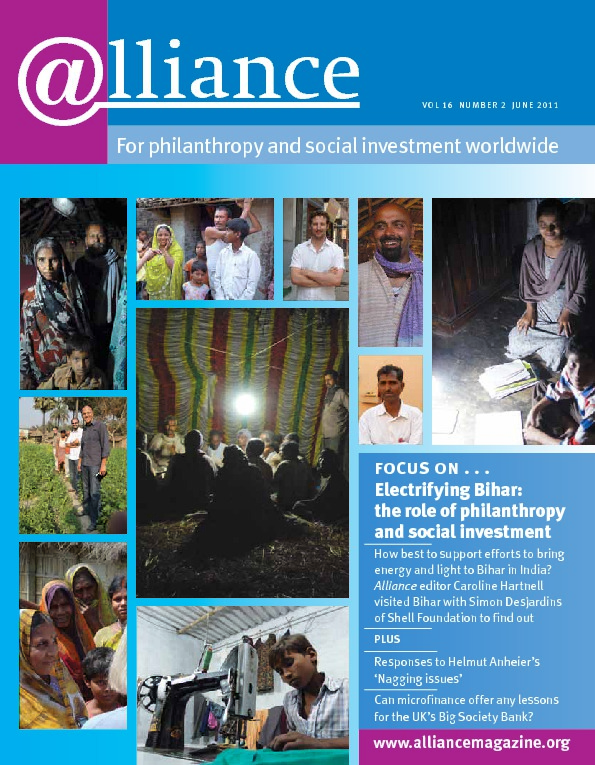We read with interest your article ‘Reframing the collaboration debate’ in the March 2011 of Alliance magazine, which cited the paper we wrote with the European Foundation Centre, Multiplying Impact through Philanthropic Collaboration. We are pleased to see this topic attract attention and discussion, since we believe it is of key importance if the foundation sector is to make significant progress on the most important issues facing society. We also agree with many of the arguments you put forward in the article itself.
However, we were disappointed that, in doing so, you chose to misrepresent the purpose and contents of our paper. Rather than seeking to make the case for collaboration, as you imply, the purpose of the paper was to illuminate ‘the critical factors relating to effective collaboration between foundations and across sectors, to identify mechanisms and services that can trigger and nurture them, and to test which of these (if any) EFC would be well placed to provide or facilitate’ (p2). The research, interviews and focus groups we conducted were intended to address this question – how can foundations collaborate successfully and what can EFC do to help – and certainly not to provide ‘hard evidence for the positive impact of collaborations’. Indeed, in the report we note the absence of such evidence from the literature. For this reason, our first recommendation to EFC is to build an ‘evidence base of compelling case studies that demonstrate effective and impactful collaboration’ (p13).
We took pains to be explicit about the purpose of our work, and the limits of its applicability, including a full page (p24) in which we discuss the approach we used, and what we do and do not feel comfortable concluding from our work. It is regrettable that you neither reflected this in your article nor made an effort to contact us for clarification prior to publication.
In spite of this, we stand by our introductory remarks on the importance of collaboration in achieving social impact. The reason is the nature of the issues themselves. The majority of the challenges facing society today are, as we assert in the paper, large and complex. They are not linear problems where a solution – though perhaps difficult to implement – can be reliably predicted and replicated, but systemic ones. Solving systemic problems requires a different approach: they change in response to efforts to address them, so what works today may not work tomorrow; and every situation is different, so what works in one situation may not in another ostensibly similar one.
There is a growing body of evidence to suggest that collaboration – aligning around a common agenda – is the most effective (and often the only) way to address such complex issues. In their excellent book on social change, Getting to Maybe, Frances Westley, Brenda Zimmerman and Michael Quinn Patton liken linear problems to getting a rocket to the moon, and systemic ones to raising a child. Both are difficult, but if we get our calculations right, we know what we need to do to get a rocket into space; however, every child is unique. While space agencies have shown themselves repeatedly capable of getting rockets into space, raising a child is a collaborative endeavour, as the old saying ‘it takes a village to raise a child’ and the more modern debates around the respective roles of parents, schools and advertising in children’s behaviour both attest. FSG has also published extensively on this topic, not least in the Stanford Social Innovation Review article on ‘Collective Impact’ written by our colleagues John Kania and Mark Kramer, which you cite (though you omit to mention the shared origins of the two papers).
We do not doubt that there are many ways in which our report could have been improved. Nevertheless, we would invite Alliance’s readership to read it for themselves and draw their own conclusions as to its value.
Marc Pfitzer and Mike Stamp
FSG Social Impact Advisors



Comments (0)